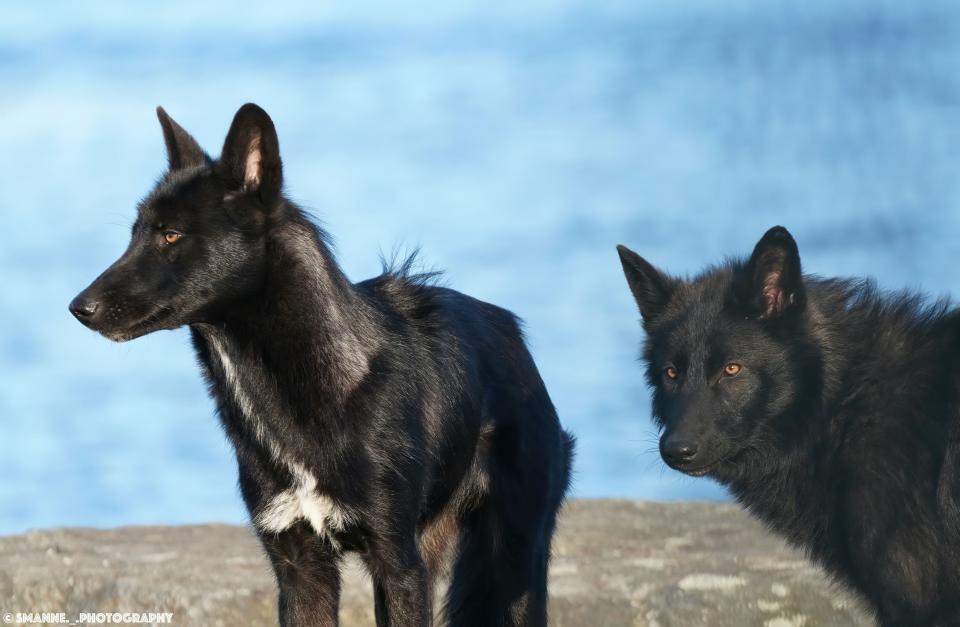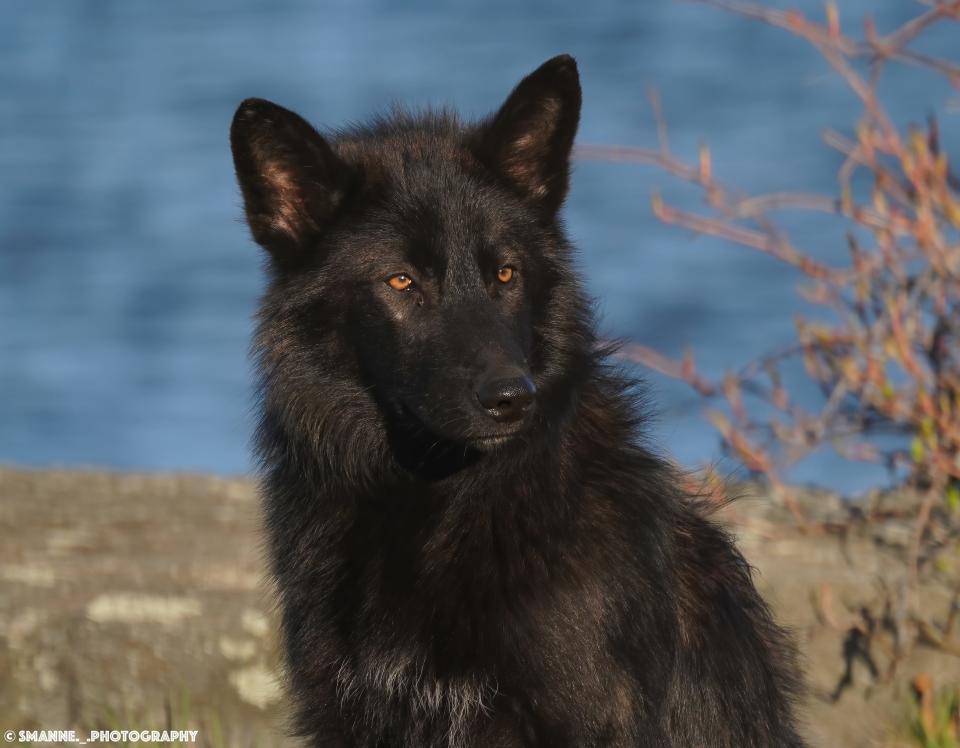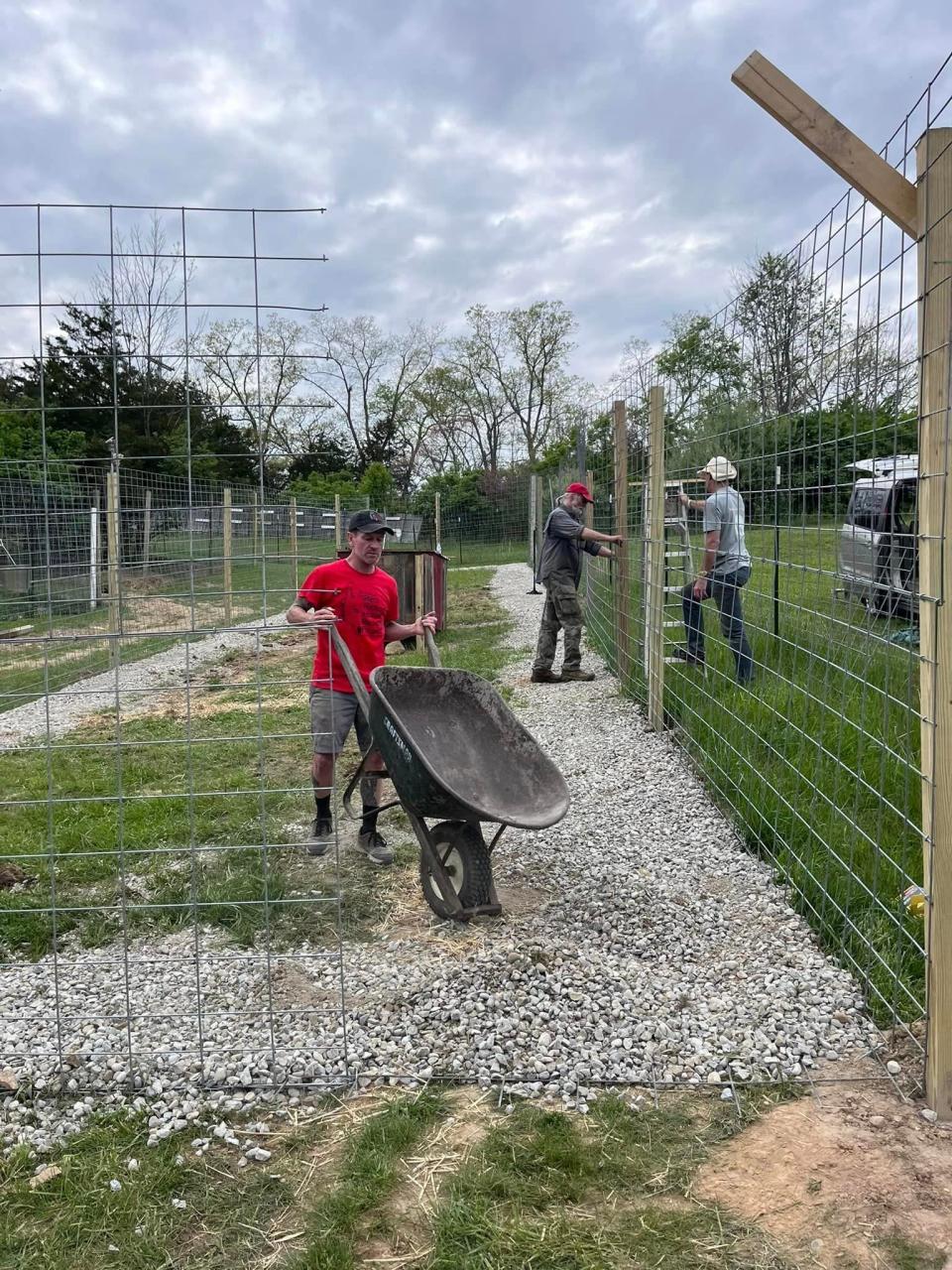From on the run to the '401 Run': Ohio sanctuary readies to receive Warwick wolf dogs
Volunteers at the Red Riding Hood Rescue Project, a wolf-dog sanctuary in Ohio, spent Saturday digging, hammering and building a home for a pair of soon-to-arrive residents from Rhode Island.
It will be called the "401 Run" as a tribute to apparent wolf dogs Bella and Libby and the people of Rhode Island who've supported their rescue efforts, donating money to transport the animals and build the run, said Susan Vogt, co-founder and board president of the rescue.
Initially believed to be black coyotes, Bella and Libby induced fascination, and some fear, when they were spotted roaming Warwick over several days in April. Warwick Mayor Frank Picozzi posted to social media, advising residents to keep their distance.

As it turns out, the pair had been kept as pets, and their owner told officials they were wolf hybrids, which are illegal in Rhode Island. Now kept at the Warwick Animal Shelter, they will soon join 18 wolf dogs at the 20-acre Ohio facility, which opened 15 months ago.
"We had hoped to be at eight animals at this point, and they keep showing up," Vogt said.
Wolf-dog hybrids a growing problem
Finding proper homes for wolf dogs can be a challenge. There are an estimated 250,000 to 500,000 wolf dogs in the United States, according to Mission: Wolf, a Colorado sanctuary. Experts say many of them are traumatized, having been kept in unfit conditions.
A combination of unethical breeding and owners with bad intentions or ignorant of wolf dogs' challenges has left sanctuaries like Vogt's trying to heal the dogs and give them better lives, experts say.
In separate cases earlier this year, Rhode Island rescuers found new homes for two wolf dogs that had been in the state illegally. One dog was adopted by an experienced owner in Vermont; another was sent to live in a sanctuary in Kansas.
The sanctuary in Middletown, Ohio, was full, or so Vogt thought, when Warwick Animal Shelter Director Ann Corvin called her about taking Bella and Libby. After Corvin made her pitch, the sanctuary decided, "Let's build. It costs money, but we can build," Vogt said.
More: How RI's wolf-dog hybrid will help bring magic to Kansas veterans
Their new home will meet U.S Department of Agriculture standards and include a doghouse, 8-foot tall fence, dig guards, sun shades and a pool. The enclosure will be 100 feet by 30 feet.
"We like it to be long enough so they can run," Vogt said.
Bella and Libby face an uphill battle, but could be adopted
DNA tests haven't come back, but Vogt says Bella and Libby, believed to be about six months old, look and act like they're part wolf. They'll be kept together, separate from the other wolf dogs, at least initially, she said. They will need a lot of work. "They're not socialized. They're not animals you can just walk up to and touch," Vogt said.

In Rhode Island, Corvin has already started trying to socialize the dogs, according to Vogt. That work will continue in Ohio. They will probably need a lot of time to decompress, adapt to their new surroundings and develop trust, Vogt said.
Walking them on a leash with other wolf dogs would mark a significant milestone, Vogt said.
"It's a very slow process," she said.
If that goes well, Bella and Libby could be adopted, but the adopter would have to meet stringent requirements, Vogt said. For example, they would need to live in a state where it's legal to own wolf-dog hybrids, have experience with wolf dogs or northern breed dogs, own their own home and have a secure outside run.
More: How RI's wolf-dog hybrid will help bring magic to Kansas veterans
"We promise a lifetime of care if they aren’t adoptable," the Red Riding Hood Rescue Project says on its Facebook page.
Vogt estimates it will cost $8,000 to build the run and bring Bella and Libby to Ohio. She won't say when they're due to arrive but noted on Friday, "We're working fast this weekend."

The all-volunteer, nonprofit sanctuary has raised about $5,200 so far, most of it from Rhode Islanders. One way they're raising money is by selling T-shirts displaying an image of Bella and Libby with the words "I GOT THE '401 GIRLS' TO THE RED." Rhode Island photographer Scott Manne snapped the photo they're using.
Even if Bella and Libby are eventually adopted and moved from the sanctuary, the "401 Run" title will remain on the pen. Vogt, impressed by the way Rhode Islanders have supported the animals, said, "It's a sign of a tremendous community of love."
This article originally appeared on The Providence Journal: Warwick wolf dogs mistaken for coyotes going to Ohio Red Riding Hood Rescue

